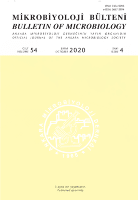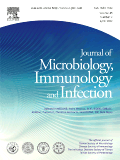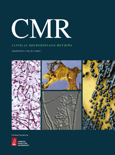
Gut Pathogens
Scope & Guideline
Pioneering Research at the Intersection of Microbiology and Gastroenterology
Introduction
Aims and Scopes
- Microbiota-Pathogen Interactions:
Research exploring how various gut microbes interact with pathogens, influencing infection outcomes and disease progression. - Gastrointestinal Infections and Pathogens:
Studies focusing on the prevalence, virulence, and antimicrobial resistance of gastrointestinal pathogens, including bacteria, viruses, and parasites. - Therapeutic Interventions:
Investigations into probiotics, fecal microbiota transplantation, and other therapeutic approaches aimed at restoring gut health and combating infections. - Metagenomics and Microbial Ecology:
Utilization of advanced genomic techniques to analyze gut microbiome composition and its fluctuations in health and disease. - Clinical Outcomes and Risk Factors:
Assessment of clinical outcomes associated with gut infections and the identification of risk factors that predispose individuals to gastrointestinal diseases. - Emerging Pathogens and Resistance Mechanisms:
Focus on the emergence of new pathogens and the mechanisms behind antimicrobial resistance in gut-associated microbes.
Trending and Emerging
- Microbiome Influence on Mental Health:
A rising interest in the links between gut microbiota and mental health conditions, such as depression and anxiety, showcases the expanding understanding of the gut-brain axis. - Fecal Microbiota Transplantation (FMT):
Increasing studies on FMT as a therapeutic option for various gastrointestinal diseases underline its relevance and potential as a treatment strategy. - Resistance Mechanisms and Antimicrobial Stewardship:
Research focusing on the mechanisms of antimicrobial resistance in gut pathogens and strategies for effective antimicrobial stewardship is becoming a focal point. - In Vitro and In Vivo Models:
The development of structured multicellular models and animal models for studying gut infections and microbiota interactions is gaining attention, promoting innovative research methodologies. - Omics Technologies in Gut Research:
The application of multi-omics technologies (metagenomics, metabolomics) for understanding gut health and disease is trending, providing comprehensive insights into microbial functions and interactions. - Global Health and One Health Approaches:
An increasing emphasis on the One Health framework, integrating human, animal, and environmental health perspectives in understanding gut pathogens and their transmission.
Declining or Waning
- Traditional Antibiotic Treatments:
As the focus shifts towards understanding the microbiome and its therapeutic potentials, traditional antibiotic treatments are being discussed less frequently compared to novel approaches like phage therapy and probiotics. - Non-Gastrointestinal Focused Pathogens:
Research specifically targeting pathogens outside the gastrointestinal tract has decreased, as the journal narrows its scope to more directly relevant gut pathogens. - Basic Microbial Characterization:
The emphasis on basic microbial characterization without clinical or therapeutic implications is waning, as studies increasingly aim to connect findings with clinical outcomes and therapeutic strategies. - Generalized Epidemiological Studies:
There is a reduction in generalized epidemiological studies that do not delve into the mechanisms of disease or gut microbiome interactions, with a greater focus now on detailed mechanistic studies.
Similar Journals

MEDICAL MICROBIOLOGY AND IMMUNOLOGY
Advancing knowledge at the intersection of microbes and immunity.Medical Microbiology and Immunology is a renowned journal published by Springer, serving as a pivotal resource in the fields of microbiology and immunology. Established in 1971 and continuing its legacy through 2024, this journal features cutting-edge research and reviews that address critical advancements and challenges within these dynamic fields. With an impressive impact factor and a robust ranking, including Q1 categories in both Microbiology (medical) and Immunology, it stands at the forefront of scholarly communication, ranking 21st out of 140 in the realm of Medical Microbiology. Researchers and professionals are encouraged to explore a variety of studies that delve into the interactions between microorganisms and the immune system, making it an essential resource for anyone fascinated by these interconnected realms of health sciences. Although not open access, the journal is widely accessible through institutional libraries, ensuring that significant findings reach a global audience. The University of New York Plaza serves as its operational hub in the USA, reinforcing its international influence and dedication to advancing knowledge in microbiology and immunology.

Bioscience of Microbiota Food and Health
Unveiling the Secrets of Microbiota for Better Nutrition and Well-beingBioscience of Microbiota Food and Health, an esteemed journal published by BMFH PRESS, serves as a pivotal platform for interdisciplinary research in the expanding fields of applied microbiology, food science, and gastroenterology. Since its inception in 2014, the journal has facilitated a critical exchange of scientific knowledge, promoting advancements in our understanding of microbiota's role in human health and nutrition. With its impressive 2023 category quartile rankings—Q2 in Applied Microbiology and Biotechnology, Food Science, and Gastroenterology—it stands out among its peers, appealing to researchers, professionals, and students alike. The journal does not follow an open-access model, which underscores its exclusivity while maintaining rigorous peer-review standards. Based in Japan, it provides a global forum for innovative studies that advance the field and enhance public health outcomes. As the journal converges into its next decade, it continues to uphold its commitment to disseminating high-quality research that bridges the gap between microbiota, food, and human health.

Mediterranean Journal of Infection Microbes and Antimicrobials
Bridging gaps in understanding infectious diseases.Mediterranean Journal of Infection Microbes and Antimicrobials is a distinguished open-access journal published by GALENOS PUBL HOUSE, dedicated to advancing the understanding of infectious diseases and microbiology. Since its inception in 2011, this journal has been a vital resource for researchers, professionals, and students interested in the intricate world of microbes and their impacts on human health. With its ISSN 2147-673X, the journal has progressively gained visibility, although it currently holds a Q4 ranking in multiple categories including Immunology and Microbiology, and Infectious Diseases for the year 2023. The journal operates from its headquarters in Istanbul, Turkey, and features a rich array of articles that contribute to the field’s body of knowledge. As a platform enhancing the accessibility of research, it invites submissions from global contributors to foster collaboration and innovation in tackling microbial challenges.

MIKROBIYOLOJI BULTENI
Pioneering Insights in Immunology and MicrobiologyMIKROBIYOLOJI BULTENI, with ISSN 0374-9096, is a prestigious academic journal published by the ANKARA MICROBIOLOGY SOC, located in Ankara, Turkey. Established in 1973, this journal has been a vital conduit for disseminating research in the fields of Immunology, Microbiology, and Infectious Diseases, garnering a reputation as a significant contributor to the scientific community. The journal is currently ranked in the Q3 category within Immunology and Microbiology (miscellaneous), and Infectious Diseases, indicating its impactful presence amidst contemporary research. With access options that may be restricted, MIKROBIYOLOJI BULTENI actively welcomes submissions that advance the understanding of critical microbiological principles and practices, thereby supporting both national and international research efforts. Researchers, professionals, and students are encouraged to explore the latest findings shared in this journal, as it continually shapes the landscape of microbiology and infectious disease studies through its comprehensive and rigorous peer-reviewed publications.

JOURNAL OF MICROBIOLOGY IMMUNOLOGY AND INFECTION
Pioneering groundbreaking studies in microbiology.Welcome to the Journal of Microbiology Immunology and Infection, a premier academic publication established in 1998 and now proudly owned by Elsevier Taiwan. As an Open Access journal since 2016, it provides unrestricted access to groundbreaking research in the fields of immunology, microbiology, and infectious diseases, making it an essential resource for researchers, practitioners, and students alike. The journal holds impressive rankings, including Q1 status in categories such as Infectious Diseases and Microbiology (medical), and a notable 92nd percentile in its Scopus ranking for Medicine - Infectious Diseases. With a dedicated focus on advancing knowledge and fostering collaboration within the scientific community, the Journal of Microbiology Immunology and Infection is committed to publishing high-impact research that significantly influences practice and policy in healthcare and life sciences. The journal is also recognized for its contribution to the ongoing dialogue surrounding contemporary issues in immunology and infection, positioning it as a vital platform for scholarly exchange and innovation.

CLINICAL MICROBIOLOGY REVIEWS
Unraveling the complexities of infectious diseases.CLINICAL MICROBIOLOGY REVIEWS, published by the American Society for Microbiology, is a leading journal in the fields of epidemiology, immunology, and microbiology, notably recognized for its Q1 status in multiple categories such as Infectious Diseases and Public Health. With an ISSN of 0893-8512 and E-ISSN of 1098-6618, this esteemed journal offers comprehensive reviews and analyses that contribute to the advancement of clinical microbiology practices worldwide. Since its inception in 1988, it has established itself as a pivotal resource for researchers and healthcare professionals, delivering high-quality, peer-reviewed articles that are instrumental in understanding microbial diseases. The journal is highly regarded in the academic community, boasting impressive Scopus rankings, including Rank #1 in Medical Microbiology and a commendable 99th percentile in Public Health. Although not available as an open-access publication, CLINICAL MICROBIOLOGY REVIEWS remains an essential tool for those seeking to enhance their knowledge and practice in microbiology, making significant impacts on clinical outcomes and public health initiatives.

Infectious Disease Reports
Disseminating vital research for a healthier global community.Infectious Disease Reports is a premier open-access journal published by MDPI, dedicated to advancing the field of infectious diseases. Since its inception in 2009, this journal has established itself as a significant platform for disseminating cutting-edge research, reviews, and case studies, critical for global health. With a commendable Q2 ranking in the category of Infectious Diseases and a Scopus rank of #140 out of 344, it is recognized for its impactful contributions to medical research, holding a 59th percentile in its field. The journal aims to provide comprehensive insights into various dimensions of infectious diseases, ranging from epidemiology to novel treatment modalities. As an open-access publication, Infectious Disease Reports ensures that its articles are freely available to a wide audience, fostering collaborative efforts among researchers, healthcare professionals, and students worldwide. With its ongoing commitment to excellence, the journal plays an essential role in shaping the future of infectious disease research.

BMC MICROBIOLOGY
Pioneering discoveries in microbiology, accessible to all.BMC Microbiology is a leading open access journal published by BMC, dedicated to advancing the field of microbiology since its inception in 2001. With an ISSN of 1471-2180, this journal provides a vital platform for researchers, professionals, and students to share and access high-quality research and innovation in both general and medical microbiology. Based in the United Kingdom, BMC Microbiology holds a commendable Q2 ranking in both various microbiological categories according to the 2023 Scopus rankings, indicating its strong influence in the microbiological community, with a rank of #47 out of 140 in Medical Microbiology and #62 out of 182 in general Microbiology. The journal's commitment to open access ensures that groundbreaking research is freely available to facilitate collaboration and knowledge sharing among the global community of microbiologists. With a focus on publishing original research, reviews, and case studies, BMC Microbiology plays a critical role in disseminating information that can impact health and environmental conditions around the world.

Frontiers in Cellular and Infection Microbiology
Leading the charge in microbiological excellence.Frontiers in Cellular and Infection Microbiology, published by FRONTIERS MEDIA SA, is a leading Open Access journal that has been at the forefront of microbiological research since 2011. Located in Switzerland, this journal aims to provide a platform for innovative and impactful studies in various domains including immunology, infectious diseases, and medical microbiology. With an impressive range of quartile rankings—Q1 in Infectious Diseases, Microbiology, and Microbiology (medical), and Q2 in Immunology—as of 2023, it positions itself as a highly reputable source in the academic community. Furthermore, its Scopus rankings highlight its significance within the respective fields, with top percentiles in key categories, making it an essential resource for researchers, professionals, and students alike. As an Open Access publication, it ensures that vital findings are accessible to a global audience, fostering collaboration and advancement in science.

Gastroenterology
Empowering Healthcare Professionals with Essential InsightsGastroenterology, published by W B Saunders Co-Elsevier Inc, is a premier journal dedicated to advancing the knowledge and practice within the fields of gastroenterology and hepatology. Established in 1945 and covering a wide range of topics related to digestive health, this journal holds a distinguished position in the academic community, as evidenced by its impressive Q1 status in both Gastroenterology and Hepatology categories, and its high rankings (4th in both disciplines) in Scopus, placing it in the top percentile for scholarly impact. With its commitment to publishing high-quality research, reviews, and clinical studies, Gastroenterology provides an essential resource for researchers, healthcare professionals, and students seeking cutting-edge insights that inform clinical practices and enhance patient care. Although it does not currently offer open access, the journal continues to serve as a vital platform for disseminating meaningful research that shapes the future of digestive disease management.